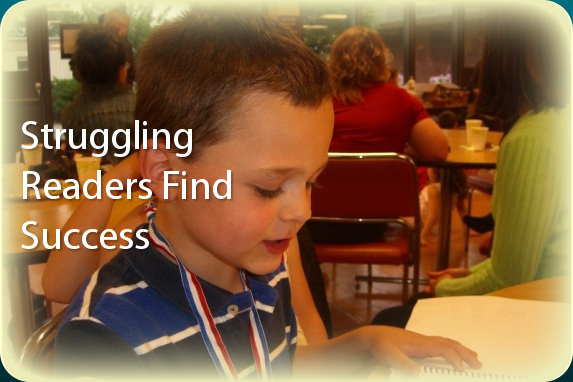*Peer review is the evaluation of creative work or performance by
other people in the same field in order to maintain or enhance the
quality of the work or performance in that field. It is based on the concept that a larger and more diverse group of
people will usually find more weaknesses and errors in a work or
performance and will be able to make a more impartial evaluation of it
than will just the person or group responsible for creating the work or
performance.
*definition from The Linux Project
Reviewer #1:
Bryce Thompson - Teacher - New Hope Academy, East Killingly, CT
My
name is Bryce Thompson, and I am a teacher at New Hope Academy in East
Killingly, Connecticut. Here is my perspective on the progress of two
students, with regards to Print Inverted Reading.
Kyra (9 years old):
Kyra
is my daughter. She has always been very bright and insightful, even
from an early age. She picked up on things really quickly, and almost
seemed intuitive when it came to applying her mind to her surroundings. I
became a little uneasy as she began to experience more and more trouble
with reading. She did not look forward to our nightly reading together,
nor practicing her sight words. I thought, "Well, all kids are
different, and she'll come around soon." However, when she spent a year
without progress in a special reading program at her public school
(which I will say was sincerely trying to help her), I started to
worry. A year and a half ago, I enrolled her in NHA, where I was
teaching. I observed her handwriting was sloppy and her letters where
out of order. She soon began working with Mr. Round. He discovered that
she read naturally while holding the text at a 90 degree angle. She
suddenly became excited about reading and made great strides, not only
in her performance, but in her confidence as well. She trained with him,
reading and writing "her way". As she progressed, I noticed she was
not always reading at an angle. She now no longer reads nor writes while
holding the text at a 90 degree angle. She holds it in the "standard
orientation". Kyra enjoys her school work, does very well on spelling
tests and written assignments, and her penmanship is better than my own.
She has no difficulty with the task of reading, and rises to the
academic challenges presented to her. Mr. Round
has re-energized my daughter by simply allowing her to encounter
textual information in a way that aligned with her brain's natural
perception of it. By having this freedom, she has gathered her
intellectual wings beneath her and she can soar.
Jacob (11 years old):
A
little over a year ago, I met Jacob. He transferred to NHA from his
previous school, with the hope of a fresh learning environment. I
remember when we, as a staff, were discussing the possibility of his
enrollment. We were not sure if we were equipped, as a school,
to accommodate and benefit a student with his array of diagnoses and
special needs. We maintained a positive attitude, nonetheless. I
immediately saw that he was shy and timid and quiet, as he was
predominantly for the remainder of the school year. My first assessment
with him was his reading. I instructed Jacob to read a
third level text, with the standard orientation. Since Mr. Round had
already been a great service to other students, I then gave him a
different text (a fourth level text), and instructed him to read with
an inverted orientation. His fluency and word speed improved with the
higher level text! Mr. Round began working diligently with Jacob, who
relished his time with this new teacher. Jacob could not wait for Mr.
Round to arrive so he could begin reading. It was not long before Jacob
was also enjoying success on spelling tests, which was one of the
many academic assessments abandoned by his previous school, due to his
"inability". This year, Jacob is in my fifth level classroom. His weekly
spelling tests have 20 or more English words, along with the
definitions of 10-15 of those. In addition, I have incorporated Latin
phrases, the Greek alphabet, Spanish vocabulary, and a multiple
paragraph writing assignment, in which students
must correctly use a set number of words from the test within their
composition. That's just the spelling test. Like any other student, he
is not thrilled with this. However, Jacob has proven himself capable of
success, even with these academic demands. Just as with my daughter,
Kyra, Jacob completes his work with the standard orientation of text. He
has refused my suggestion to return to an inverted orientation, because
"he doesn't have to". Jacob is blossoming socially, daily requiring
redirections to be quiet and remain focused on work instead of peers. He
has learned to ask for help if he gets stuck. He is bright, cheerful,
engaging, and finally, if he does not complete his assigned tasks, it's
because he didn't feel like it-- not because "he can't".














